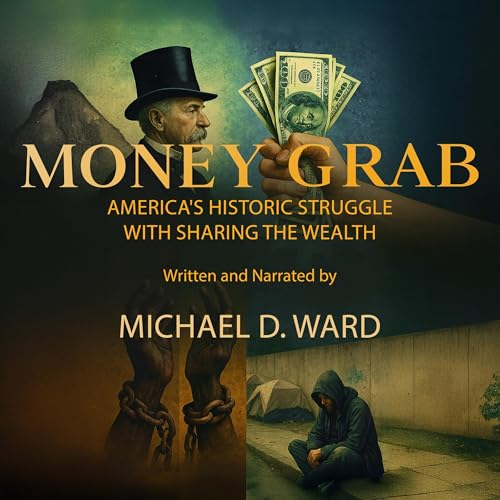
Money Grab
America's Historic Struggle with Sharing the Wealth
カートのアイテムが多すぎます
カートに追加できませんでした。
ウィッシュリストに追加できませんでした。
ほしい物リストの削除に失敗しました。
ポッドキャストのフォローに失敗しました
ポッドキャストのフォロー解除に失敗しました
2か月無料体験
聴き放題対象外タイトルです。プレミアムプラン登録で、非会員価格の30%OFFで購入できます。
¥1,900 で購入
-
ナレーター:
-
Michael D. Ward
-
著者:
-
Michael D. Ward
このコンテンツについて
The United States is the wealthiest nation on earth, though an elite ownership class holds most of its wealth. Working-class wages have not kept up with the cost of living. As government weighs taxation and the cost of social programs, it is helpful to understand our history. Our struggle sharing the wealth has roots in the period of reconstruction, Jim Crow laws, and government-imposed discrimination in housing and employment.
Money Grab describes U.S. income and wealth disparity and research on the persistence of poverty and generational wealth. Our system was initially designed to tax those who can afford it and gain the greatest economic benefits. The author reviews the evolution of the tax code and significant shifts that occurred.
The Industrial Revolution changed how workers relate to owners. While labor policy once helped, it now impedes the working class from securing an economic foothold. Corporations have tax advantages and have gained certain individual rights through the courts, giving those who own them an outsized voice in government, unduly influencing legislation and policy.
Solutions require strong democratic participation. Money Grab describes centuries of democratic history and participation. U.S. democracy is 250 years old; the right to vote has only been broadly guaranteed for decades. We have lower voter participation than other developed countries, leaving control to those who participate and shape the system to their benefit.
Poverty and health are closely correlated. Money Grab discusses the U.N.'s Universal Declaration of Human Rights and how the right to health and healthcare is recognized by many developed countries. Despite spending more of its GDP on healthcare than any other developed country, the U.S. has worse health outcomes.
An economically polarized society is not sustainable. Money Grab closes with recommendations on tax and other policy choices that could help overcome the income and wealth disparity in the U.S. today.
©2025 Michael D. Ward (P)2025 Michael D. Ward


